Moans of a people; villages named after genitals cry of neglect (August 4)
- Get link
- X
- Other Apps
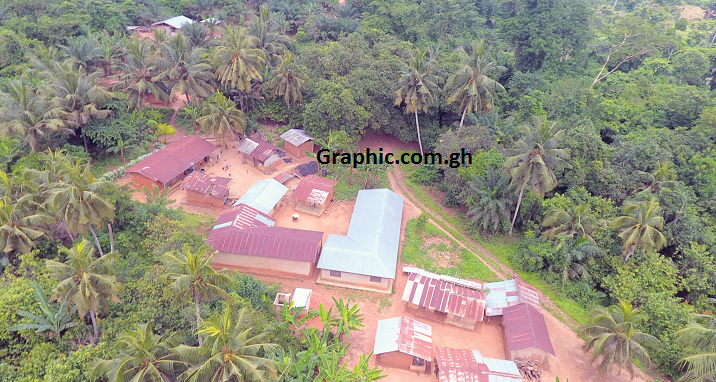
Their names evoke laughter, and for many conservative Ghanaians, such names are better mentioned in the bedroom or in whispers.

Their names evoke laughter, and for many conservative Ghanaians, such names are better mentioned in the bedroom or in whispers.
So Members of Parliament (MPs) were beside themselves with laughter
when the MP for Abirem, Mr John Frimpong Osei, mentioned three villages
in his constituencies that needed electricity during question time with
the Energy Minister.
Mr Osei sought to find out when those villages and many others in his constituency would join the national grid.His enquiries went this way. “Mr Speaker, I rise to ask the Energy
Minister whether the Ministry has plans to provide electricity for the
following communities in the Abirem Constituency, which are difficult to
connect to the national grid. Kyiri Ahantan, Twe nyui su, Etwe nim
Nyansa, Koti Ye Aboa, Hyoa Ye Mmobo… Kasabrofo, Asarekrom, Alhajikrom
and Yaw Broni.”
Mr Osei sought to find out when those villages and many others in his constituency would join the national grid.His enquiries went this way. “Mr Speaker, I rise to ask the Energy Minister whether the Ministry has plans to provide electricity for the following communities in the Abirem Constituency, which are difficult to connect to the national grid. Kyiri Ahantan, Twe nyui su, Etwe nim Nyansa, Koti Ye Aboa, Hyoa Ye Mmobo… Kasabrofo, Asarekrom, Alhajikrom and Yaw Broni.”
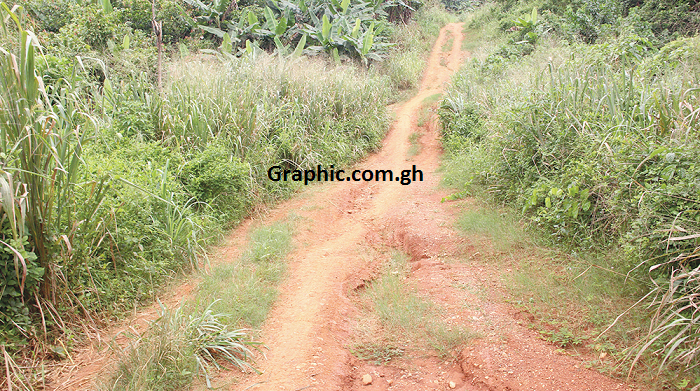
The road leading to the cottages are hilly, bumpy and undulating
The House erupted into laughter, with some holding their ribs because they had not held those names before.
A visibly excited First Deputy Speaker of Parliament, Mr Joseph Osei-Wusu, could also not hold his laughter.
The Energy Minister, Mr Boakye Agyarko, added his dose to the humour,
saying, “Mr Speaker, I now understand why the honourable member from
Abirem belongs to a happy lot. Coming from constituencies with such
names, you can only be happy.”
But there are names in other parts of the country which are equally
heavy to pronounce: ‘Akoti’ on the Suhum Koforidua road, Vekoloenu in
the Volta Region and Koti M’muada, also in the Eastern Region.
However, for some residents of Koti Ye Aboa (to wits, “Penis is a
fool,” “Etwe Nim Nyansa - "Vagina is Wise" and Hyoa Ye Mmobo -
"Testicles are Miserable" deep in the belly of cocoa plantations in the
Birim North District in the Eastern Region, there is nothing to be
shamed of. It is their heritage, one they cherish and are proud of.
On a sunny day last Wednesday, an Octogenarian is busily clearing
weeds under cocoa trees. He is surrounded by kola nut and plantain trees
and by the necessities of his life: a mud house with a solar panel that
has seen better days, an empty basket, a pile of charcoal and cocoa
beans being dried on a mat. He smiles, showing a gaped tooth before
shaking hands. In no time, there was a gathering under a huge shade of
kola nut trees—the community square.
There was a lightened mood the moment our mission was announced. It
quickly generated into a healthy discussion about the historical
antecedent to the names of the three cottages that evoke laughter and
discomfort for those not comfortable with the names.
“I have voted since the Nkrumah days but the only thing I have
benefited is a solar power distributed by a former Regional Minister, Ms
Mavis Ama Frimpong. It is like we are cut off from the rest of the
country.
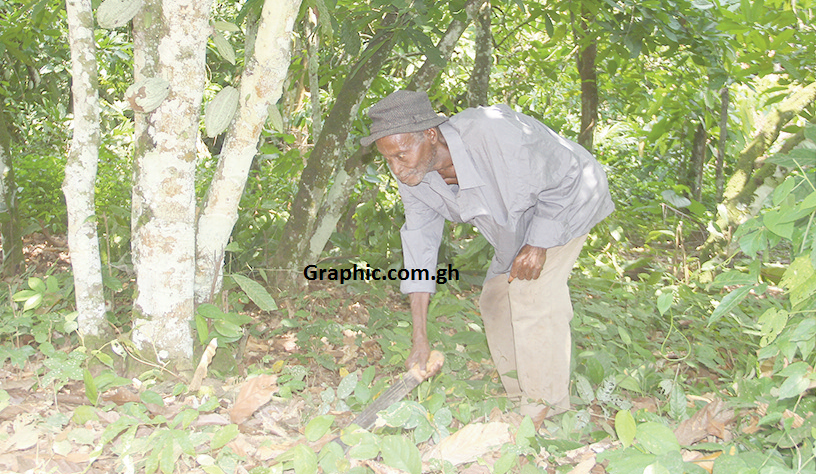
Old Djabatey gets busy with a cuttlass cleraing weed in his farm.
During the Nkrumah days, you can get a labourer’s job and get paid,”
Mr Henry K. Djabatey, a migrant farmer from the Kroboland who has stayed
permanently in the community since the 1970s, said.
Others, including Atta Obom, a resident, agreed before delving into
the history of the town that is tucked in a cocoa plantation and out of
sight and deeply in need.
The road leading to the cottages are hilly, bumpy and undulating
The House erupted into laughter, with some holding their ribs because they had not held those names before.A visibly excited First Deputy Speaker of Parliament, Mr Joseph Osei-Wusu, could also not hold his laughter.
The Energy Minister, Mr Boakye Agyarko, added his dose to the humour,
saying, “Mr Speaker, I now understand why the honourable member from
Abirem belongs to a happy lot. Coming from constituencies with such
names, you can only be happy.”
But there are names in other parts of the country which are equally
heavy to pronounce: ‘Akoti’ on the Suhum Koforidua road, Vekoloenu in
the Volta Region and Koti M’muada, also in the Eastern Region.However, for some residents of Koti Ye Aboa (to wits, “Penis is a fool,” “Etwe Nim Nyansa - "Vagina is Wise" and Hyoa Ye Mmobo - "Testicles are Miserable" deep in the belly of cocoa plantations in the Birim North District in the Eastern Region, there is nothing to be shamed of. It is their heritage, one they cherish and are proud of.
On a sunny day last Wednesday, an Octogenarian is busily clearing weeds under cocoa trees. He is surrounded by kola nut and plantain trees and by the necessities of his life: a mud house with a solar panel that has seen better days, an empty basket, a pile of charcoal and cocoa beans being dried on a mat. He smiles, showing a gaped tooth before shaking hands. In no time, there was a gathering under a huge shade of kola nut trees—the community square.
There was a lightened mood the moment our mission was announced. It quickly generated into a healthy discussion about the historical antecedent to the names of the three cottages that evoke laughter and discomfort for those not comfortable with the names.
“I have voted since the Nkrumah days but the only thing I have benefited is a solar power distributed by a former Regional Minister, Ms Mavis Ama Frimpong. It is like we are cut off from the rest of the country.

Old Djabatey gets busy with a cuttlass cleraing weed in his farm.
During the Nkrumah days, you can get a labourer’s job and get paid,” Mr Henry K. Djabatey, a migrant farmer from the Kroboland who has stayed permanently in the community since the 1970s, said.
Others, including Atta Obom, a resident, agreed before delving into the history of the town that is tucked in a cocoa plantation and out of sight and deeply in need.
Genesis of names
According to Mr Obom, the oral history he knows (he is fourth
generation) was that his great grandfather, Kofi Siaw, and his two
brothers—Kojo Gyan and Kofi Sampong, founded the three cottages.
The three had started life in a community called ‘Mia w’ani,’ which means “Try harder,” near Kwamang in the Ashanti Region.
They, however, moved to their current location where they found the land to be fertile.
Shortly after that, Kojo Gyan decided to marry against his brothers’ advice to be careful.
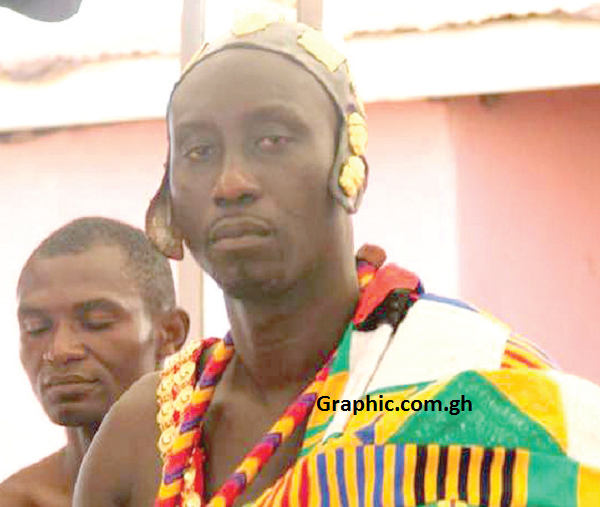
Nana Dr Boakye Dakwa III, Akyem Kotoko Mponuahene
After the marriage, the wife advised that they move away from his
brothers, which they did and settled on the woman’s family land.
He said the couple worked very hard and became prosperous but the
woman divorced the man, insisting that she was no longer interested in
the marriage.
With a heavy heart, he returned to his brothers’ home, a pauper, to ask for help.
By now, his two brothers had also become prosperous. When they met,
they teased him, saying, “You see what vagina has done to you?”
You followed vagina and today, you’ve become very pathetic. You left
us for vagina (woman) and are you now turning to us for help? In
response, Gyan, who was indeed miserable, made a profound statement that
would become the names of the three cottages.
He said in Twi: “I have realised that penis is a fool and vagina is wise.”
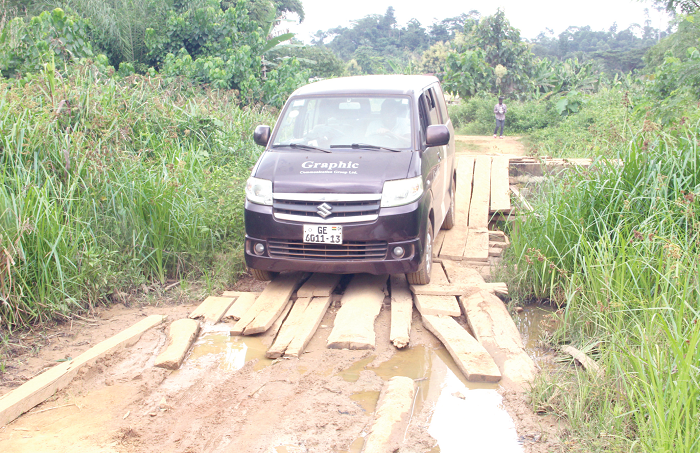
The state of the Asuafu bridge on the road supported by planks to make passage possible
He jokingly added that “testicles are miserable."
The three laughed over it. Gyan decided to adopt ‘Etwe nim Nyansa’
for his cottage, Kofi Siaw took the name “Koti Ye Aboa,” while Kofi
Sampong settled on “Hyoa Ye Mmobo.”
In no time, the names spread like wildfire and got to the attention
of the Odahene, Nana Attafuah, who summoned them to his palace to
explain the meaning of the names because he felt embarrassed to have
such indecent names in his jurisdiction.
The chief reasoned with their explanation and subsequently decreed that they could keep the name.
Asked whether the villagers don’t feel embarrassed mentioning such names, he smiled and said: “No. It is our heritage”.
The three had started life in a community called ‘Mia w’ani,’ which means “Try harder,” near Kwamang in the Ashanti Region.
They, however, moved to their current location where they found the land to be fertile.
Shortly after that, Kojo Gyan decided to marry against his brothers’ advice to be careful.

Nana Dr Boakye Dakwa III, Akyem Kotoko Mponuahene
After the marriage, the wife advised that they move away from his
brothers, which they did and settled on the woman’s family land.He said the couple worked very hard and became prosperous but the woman divorced the man, insisting that she was no longer interested in the marriage.
With a heavy heart, he returned to his brothers’ home, a pauper, to ask for help.
By now, his two brothers had also become prosperous. When they met, they teased him, saying, “You see what vagina has done to you?”
You followed vagina and today, you’ve become very pathetic. You left us for vagina (woman) and are you now turning to us for help? In response, Gyan, who was indeed miserable, made a profound statement that would become the names of the three cottages.
He said in Twi: “I have realised that penis is a fool and vagina is wise.”

The state of the Asuafu bridge on the road supported by planks to make passage possible
He jokingly added that “testicles are miserable."The three laughed over it. Gyan decided to adopt ‘Etwe nim Nyansa’ for his cottage, Kofi Siaw took the name “Koti Ye Aboa,” while Kofi Sampong settled on “Hyoa Ye Mmobo.”
In no time, the names spread like wildfire and got to the attention of the Odahene, Nana Attafuah, who summoned them to his palace to explain the meaning of the names because he felt embarrassed to have such indecent names in his jurisdiction.
The chief reasoned with their explanation and subsequently decreed that they could keep the name.
Asked whether the villagers don’t feel embarrassed mentioning such names, he smiled and said: “No. It is our heritage”.
Contrary explanation
The Akyem Kotoko Mponuahene, Nana Dr Boakye Dakwa III, had a contrary
explanation as to why the trio were summoned by the Odahene.
He said when the Odahene heard the names, he thought it was meant to
insult him because the Mponua or Prankese lands, where the three
communities were located, were pledged to Akyem Oda by its leaders,
after a protracted land dispute with the Kwahus which was settled in
1888.
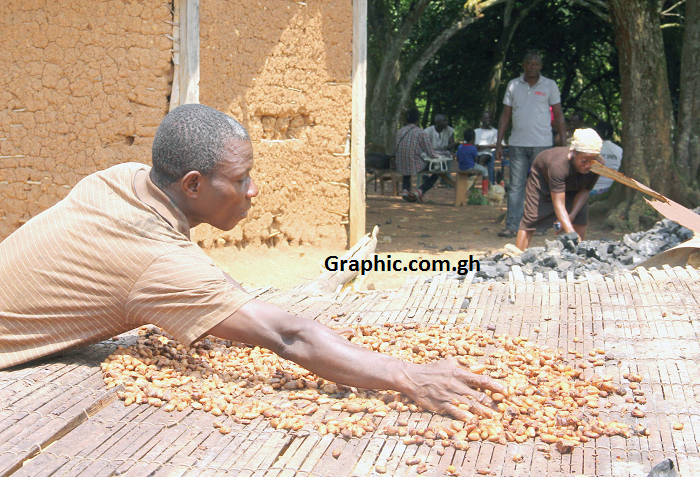
Atta Obom, a resident of Kotiyeboa drying cocoa beans
However, to defend his subjects, he said the Prankesehene at the
time, Nana Affum Missah, went to Oda with the trio to explain to him
that there was a history behind the names and that it was not meant to
spite the Odahene who, although respected by the people of Prankese, was
not the owner of its lands.
With the history out of the way, the discussion turned again to politics and development.
He said when the Odahene heard the names, he thought it was meant to insult him because the Mponua or Prankese lands, where the three communities were located, were pledged to Akyem Oda by its leaders, after a protracted land dispute with the Kwahus which was settled in 1888.

Atta Obom, a resident of Kotiyeboa drying cocoa beans
However, to defend his subjects, he said the Prankesehene at the
time, Nana Affum Missah, went to Oda with the trio to explain to him
that there was a history behind the names and that it was not meant to
spite the Odahene who, although respected by the people of Prankese, was
not the owner of its lands.With the history out of the way, the discussion turned again to politics and development.
The journey
The three cottages are about an hour and half from Abepotia, near Nkawkaw.
In communities in which the only sign of technology is solar cells
and mobile phones that have seen better days, Mr Obom said for years the
community had for years been neglected and left out of many development
projects.
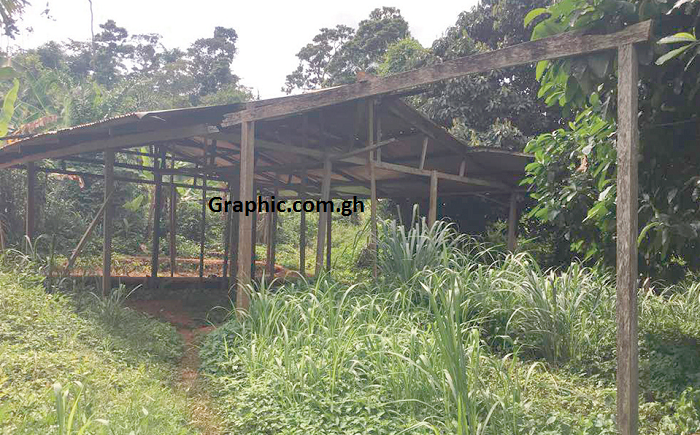
This nursery in asarekrom a nearby village meant for the children of the three cottages has been abandoned
There is no electricity, no school, no healthcare and the road
leading to the cottage is a hilly, bumpy, rugged and undulating terrain
that only SUVs and tractors could survive.
A road that passes though the communities, which construction started
under the Mahama administration, has been abandoned. The bridges on the
road are supported by planks to make passage possible.
To get to the three cottages, the Daily Graphic team had to park its
vehicle and trek. Our guide and assembly member for the
Kyenkyenku-Dekyemso Electoral Area told us that the village was just
around the corner but it took almost 20 minutes of meandering through
narrow paths in cocoa plantations to get there.
It was like the middle of nowhere until we chanced upon ‘Shua ye
Morbor’—the original building—a mud house with iron roofing sheet— still
stands defiantly but with some extensions.
In communities in which the only sign of technology is solar cells and mobile phones that have seen better days, Mr Obom said for years the community had for years been neglected and left out of many development projects.

This nursery in asarekrom a nearby village meant for the children of the three cottages has been abandoned
There is no electricity, no school, no healthcare and the road
leading to the cottage is a hilly, bumpy, rugged and undulating terrain
that only SUVs and tractors could survive.A road that passes though the communities, which construction started under the Mahama administration, has been abandoned. The bridges on the road are supported by planks to make passage possible.
To get to the three cottages, the Daily Graphic team had to park its vehicle and trek. Our guide and assembly member for the Kyenkyenku-Dekyemso Electoral Area told us that the village was just around the corner but it took almost 20 minutes of meandering through narrow paths in cocoa plantations to get there.
It was like the middle of nowhere until we chanced upon ‘Shua ye Morbor’—the original building—a mud house with iron roofing sheet— still stands defiantly but with some extensions.
Original buildings
Then came ‘Koti Ye Aboa’ with similar structures. The old house, with
its kitchen and bedrooms, still stands. It appears to be the most
prosperous of the three. The community square is also located here, with
its plush green canopy of kola trees.
With one crumbled building to show for years of nature’s wear and
tear, ‘Etwe Nim Nyansa’, the original building of the cottage, still
exists.
Pointing to the solar panel with wires hanging from the rooftop, Mr
Obom said: “We don’t have electricity. Our children use torchlight to
learn.
In the absence of electricity, our youth who would have taken over as
the next generation of farmers are leaving for towns and cities.
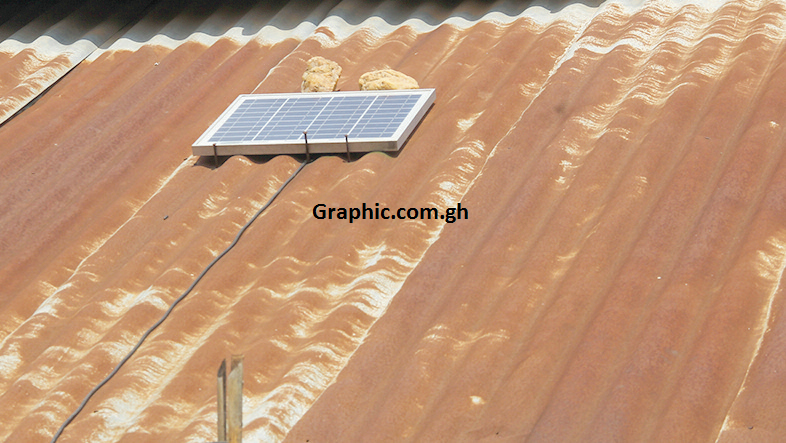
This solar panel which is out of use is the closest to technology present
Some of them are selling Fan Milk and carrying loads in markets. They
are sleeping on the streets. It is more depressing because the future
of cocoa production is bleak.”
“When you call them to come back, they insist there is no
electricity; they can’t come back and live in darkness. The government
needs to connect us to electricity so that our young men can come back.
" Cocoa is a major backbone of the economy. It is a treasure. We have
lands that can be cultivated. If we have electricity, it will be highly
beneficial. We can use it to open small businesses, including a cold
store to sell frozen fish and meat. We don’t get fish or meat to buy
here. If there was electricity, it would us greatly,” he said.
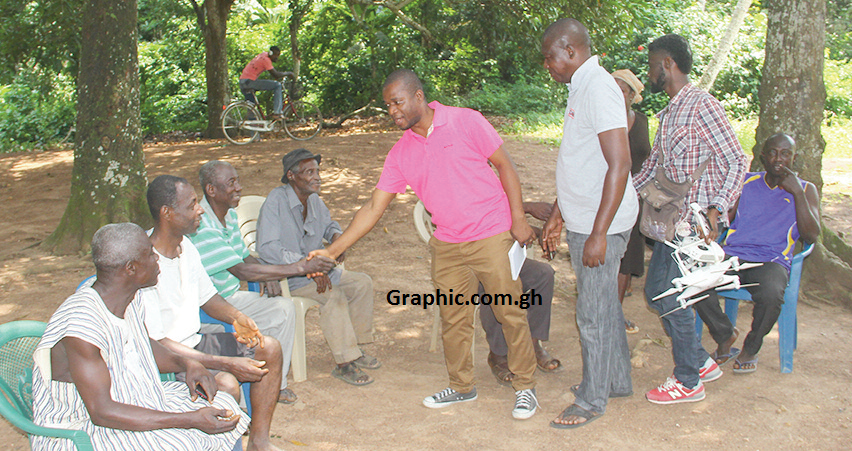
The Daily Graphic team led by our reporter, Seth J. Bokpe, in a handshake with opinion leaders of the three cottages
To charge their phones, they take at least a two-kilometre walk to
either Kyenkyenku or Abokyi and return sometimes without the batteries
as they get stolen.
Then came ‘Koti Ye Aboa’ with similar structures. The old house, with its kitchen and bedrooms, still stands. It appears to be the most prosperous of the three. The community square is also located here, with its plush green canopy of kola trees.
With one crumbled building to show for years of nature’s wear and tear, ‘Etwe Nim Nyansa’, the original building of the cottage, still exists.
Pointing to the solar panel with wires hanging from the rooftop, Mr Obom said: “We don’t have electricity. Our children use torchlight to learn.
In the absence of electricity, our youth who would have taken over as the next generation of farmers are leaving for towns and cities.

This solar panel which is out of use is the closest to technology present
Some of them are selling Fan Milk and carrying loads in markets. They
are sleeping on the streets. It is more depressing because the future
of cocoa production is bleak.”“When you call them to come back, they insist there is no electricity; they can’t come back and live in darkness. The government needs to connect us to electricity so that our young men can come back.
" Cocoa is a major backbone of the economy. It is a treasure. We have lands that can be cultivated. If we have electricity, it will be highly beneficial. We can use it to open small businesses, including a cold store to sell frozen fish and meat. We don’t get fish or meat to buy here. If there was electricity, it would us greatly,” he said.

The Daily Graphic team led by our reporter, Seth J. Bokpe, in a handshake with opinion leaders of the three cottages
To charge their phones, they take at least a two-kilometre walk to
either Kyenkyenku or Abokyi and return sometimes without the batteries
as they get stolen.No school
On education, Nana Kofi Marfo, the chief of the three cottages, said the communities were in dire need of a school.
“We have children who also deserve to be in kindergarten but there is
none. We have a lot of children who sit at home because the distance is
long and get muddy in the rainy season.
They stay home and outgrow
their first class before they go to school. Some of them get to six
years before starting nursery. When they realise that they are older
than their class, they quit school because they become shy,” he added.
The Assembly Member for Kyenkyenku-Dekyemso Electoral, Mr Seth K.
Amposah, narrated a harrowing incident in 2016 when a primary school
child was beheaded while on the long walk to school.
He, however, said a school initiated by the community with support
from Ms Frimpong had stalled because it had no plans for a teacher’s
bungalow.
Abigail Kissiwa and Peter Osei, a Primary Six and Form Two student,
respectively, told the Daily Graphic that by the time “we get to school
daily, we get so tired that learning becomes difficult and we often
struggle to keep up with the class.”

Aerial view of Koti Ye Aboa
With the hustle of these pupils probably in mind, Nana Darkwa said,
“it is ironical that they would be expected to write the same
examinations with their counterparts in developed communities across the
country.”
“Are we really giving these children the chance to make it in life, given the challenges they had to go through? “
“We have children who also deserve to be in kindergarten but there is none. We have a lot of children who sit at home because the distance is long and get muddy in the rainy season.
They stay home and outgrow their first class before they go to school. Some of them get to six years before starting nursery. When they realise that they are older than their class, they quit school because they become shy,” he added.
The Assembly Member for Kyenkyenku-Dekyemso Electoral, Mr Seth K. Amposah, narrated a harrowing incident in 2016 when a primary school child was beheaded while on the long walk to school.
He, however, said a school initiated by the community with support from Ms Frimpong had stalled because it had no plans for a teacher’s bungalow.
Abigail Kissiwa and Peter Osei, a Primary Six and Form Two student, respectively, told the Daily Graphic that by the time “we get to school daily, we get so tired that learning becomes difficult and we often struggle to keep up with the class.”

Aerial view of Koti Ye Aboa
With the hustle of these pupils probably in mind, Nana Darkwa said,
“it is ironical that they would be expected to write the same
examinations with their counterparts in developed communities across the
country.”“Are we really giving these children the chance to make it in life, given the challenges they had to go through? “
No clinic
In the absence of a health facility, whenever anyone falls sick and
the condition gets serious, their family members have to remove their
door to carry the person on foot to a health facility two kilometres
away.
Entertainment
With nothing to entertain them when the sun sets and their cottages wrapped in darkness, 6.30 p.m. is bed time.
“During the last World Cup, we had to walk to town to watch some of
the matches and return in the night with torchlights, with all the
snakes to contend with. We couldn’t watch all the World Cup matches
Ghana played in 2014 in Brazil.
“Are we not Ghanaians too? Mr Owusu Antwi, a resident, asked.
“During the last World Cup, we had to walk to town to watch some of the matches and return in the night with torchlights, with all the snakes to contend with. We couldn’t watch all the World Cup matches Ghana played in 2014 in Brazil.
“Are we not Ghanaians too? Mr Owusu Antwi, a resident, asked.

Comments
Post a Comment